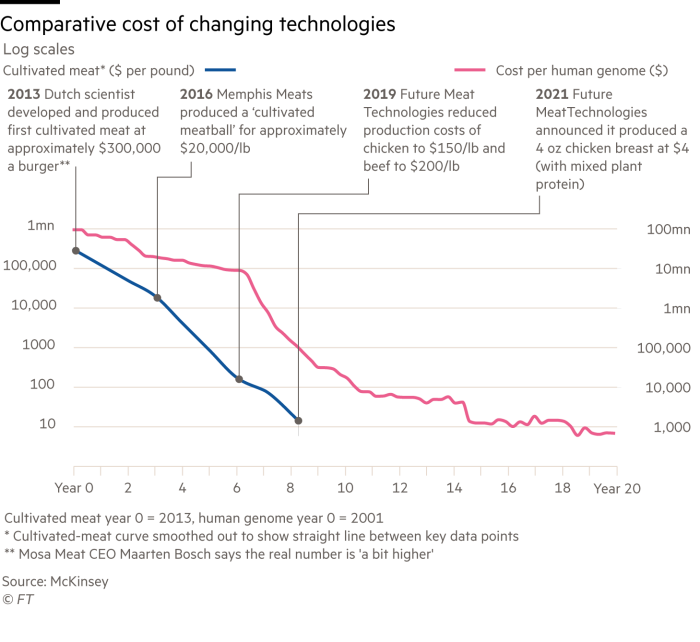
Italy has said no grazie to lab-grown meat. That is understandable, given the pride the country takes in its traditional food. But, longer term, the choice is unlikely to be between a gourmet Tuscan Chianina burger or the cultivated variety. Instead it could be between a cultured patty or an empty bun.
Prime Minister Giorgia Meloni’s ban on lab-grown meat and animal feed may simply mean her rightwing government seeks to protect local farmers. But there does not seem to be a need for that quite yet.
Cultured meat — made in a lab by growing animal cells in a protein and sugar soup — is technically viable and even approved by the US Food and Drug Administration. A lab in Australia has even grown a giant meatball using ancient mammoth DNA. Start-ups are raising money, from the likes of Bill Gates and Richard Branson. But this meat is miles away from competing with the four-legged kind.
A recent academic study estimates that a scaled-up plant would produce beef at $60/kg. A steak costs a third of that at the supermarket. However, over time the cost of alt-meat should fall as the technology improves and scale of production expands. McKinsey, a consultancy, estimates that cultivated meat might get to cost parity within the next decade.

But before that, this type of food would likely be a niche offering only, not unlike what has happened to Beyond Meat’s plant-based protein products. Its share price at about $16 is more than a third below its IPO price.
Meloni’s ban looks more like an exercise in brand protection. Given her nationalistic stripes, that would be her own brand, and that of traditional Italian food. After all, the mammoth meatball sounds rather less appetising than the more traditional polpette della Nonna.
But such on-the-hoof thinking fails to grasp the seriousness of the climate challenge. Already, agriculture contributes more than 14 per cent of global carbon emissions. As the global population grows, and becomes wealthier, we will inevitably have to reconsider what we eat.
Going the sustainable, agritech way might thus offer another way. We could eat grass-fed, sustainably grown — and much less — meat. But if we do want to have our steak, and eat it, the lab-grown option is worth cultivating.